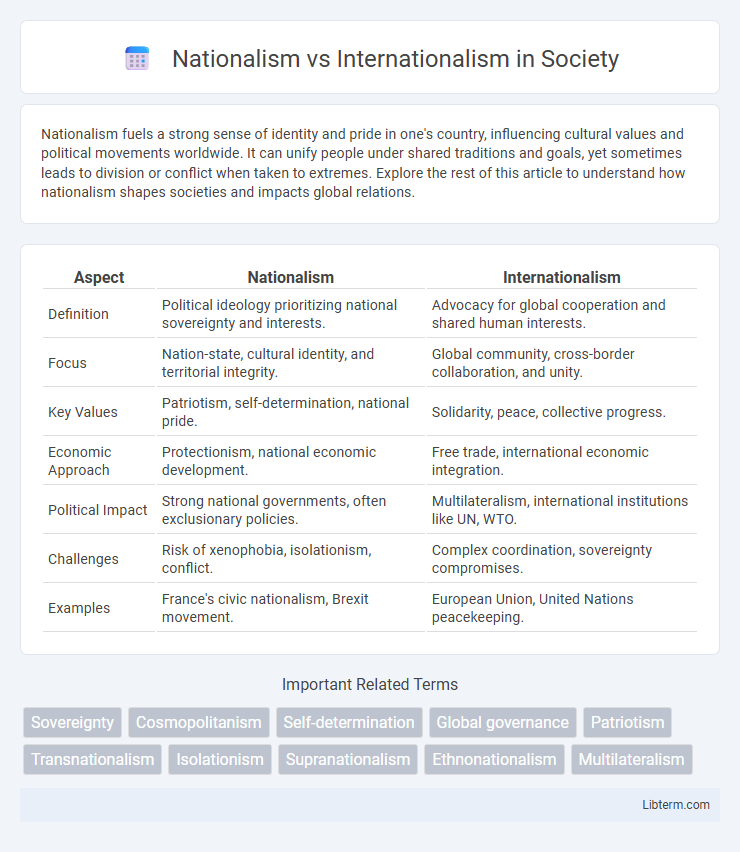Nationalism fuels a strong sense of identity and pride in one's country, influencing cultural values and political movements worldwide. It can unify people under shared traditions and goals, yet sometimes leads to division or conflict when taken to extremes. Explore the rest of this article to understand how nationalism shapes societies and impacts global relations.
Table of Comparison
| Aspect | Nationalism | Internationalism |
|---|---|---|
| Definition | Political ideology prioritizing national sovereignty and interests. | Advocacy for global cooperation and shared human interests. |
| Focus | Nation-state, cultural identity, and territorial integrity. | Global community, cross-border collaboration, and unity. |
| Key Values | Patriotism, self-determination, national pride. | Solidarity, peace, collective progress. |
| Economic Approach | Protectionism, national economic development. | Free trade, international economic integration. |
| Political Impact | Strong national governments, often exclusionary policies. | Multilateralism, international institutions like UN, WTO. |
| Challenges | Risk of xenophobia, isolationism, conflict. | Complex coordination, sovereignty compromises. |
| Examples | France's civic nationalism, Brexit movement. | European Union, United Nations peacekeeping. |
Defining Nationalism and Internationalism
Nationalism emphasizes the prioritization of a nation's interests, culture, and sovereignty, often advocating for self-governance and national unity. Internationalism promotes cooperation and solidarity among nations, supporting global governance, shared values, and collective problem-solving across borders. Defining nationalism involves recognizing the focus on state-centered identity, while defining internationalism highlights commitment to cross-national collaboration and interconnectedness.
Historical Roots of Nationalism
Nationalism emerged in the late 18th century, primarily fueled by the French Revolution and the decline of feudal states, emphasizing a collective identity based on shared language, culture, and history. This ideology sought to unite people within defined territorial boundaries, contrasting with internationalism, which promotes global cooperation beyond national borders. The rise of nationalism influenced major historical events, including the unification of Germany and Italy, as well as intense rivalries leading to World War I.
The Emergence of Internationalism
The emergence of internationalism traces back to the late 19th and early 20th centuries, marked by the formation of global institutions like the League of Nations aimed at fostering cooperation and peace among nations. Intellectual movements promoting universal human rights and economic collaboration challenged the exclusive loyalty demanded by nationalism, urging countries to prioritize global welfare over territorial sovereignty. Key events such as the aftermath of World War I demonstrated the limitations of nationalist policies, accelerating efforts to establish international frameworks for conflict resolution and collective security.
Key Differences Between Nationalism and Internationalism
Nationalism emphasizes loyalty and devotion to a specific nation, prioritizing national sovereignty, culture, and interests above others, often leading to policies favoring self-reliance and protectionism. Internationalism advocates for cooperation and unity among nations, promoting global peace, economic interdependence, and addressing transnational issues through collective efforts and institutions like the United Nations. The key difference lies in nationalism's focus on exclusive national identity and interests, while internationalism seeks inclusive collaboration across borders for shared global benefits.
Benefits and Drawbacks of Nationalism
Nationalism fosters social cohesion and pride by uniting citizens under a shared identity, promoting cultural preservation and political stability within a nation. However, excessive nationalism can lead to xenophobia, exclusionary policies, and conflicts with other countries, undermining global cooperation and peace. It often prioritizes national interests over international collaboration, limiting opportunities for economic integration and collective problem-solving on global issues.
Advantages and Challenges of Internationalism
Internationalism promotes global cooperation, fostering peace and economic development through shared resources, cultural exchange, and collective problem-solving on issues like climate change and human rights. Its advantages include enhanced diplomatic relations, increased trade opportunities, and the ability to address transnational challenges more effectively. Challenges arise from differing national interests, potential loss of sovereignty, and the complexity of coordinating policies across diverse political and cultural landscapes.
Nationalism in Modern Politics
Nationalism in modern politics emphasizes the prioritization of a nation's sovereignty, cultural identity, and economic interests over global cooperation or international institutions. It fuels populist movements and influences policies centered on immigration control, trade protectionism, and nationalism-driven foreign relations. The resurgence of nationalist ideology challenges globalization and shapes electoral outcomes in countries such as the United States, Hungary, and Brazil.
Internationalism’s Role in Global Governance
Internationalism plays a critical role in global governance by promoting cooperation among nations to address transnational challenges such as climate change, security threats, and economic instability. Institutions like the United Nations and World Trade Organization exemplify internationalism by facilitating multilateral agreements and conflict resolution. Emphasizing shared global responsibilities strengthens peace, sustainable development, and human rights protection beyond individual national interests.
Balancing National Interests and Global Cooperation
Balancing national interests and global cooperation requires prioritizing domestic economic growth while engaging in multilateral agreements that address transnational challenges like climate change and security. Effective policy frameworks integrate sovereignty preservation with commitments to international organizations such as the United Nations and World Trade Organization. Navigating this balance enhances diplomatic relations and fosters sustainable development by aligning national priorities with global objectives.
The Future of Nationalism and Internationalism
The future of nationalism is expected to evolve with increased emphasis on cultural identity and sovereignty amid global challenges such as migration and economic competition. Internationalism will likely strengthen through multilateral cooperation on climate change, trade, and security, promoting interconnected global governance frameworks. Balancing national interests with global responsibilities will shape political agendas and diplomatic strategies in the coming decades.
Nationalism Infographic

 libterm.com
libterm.com